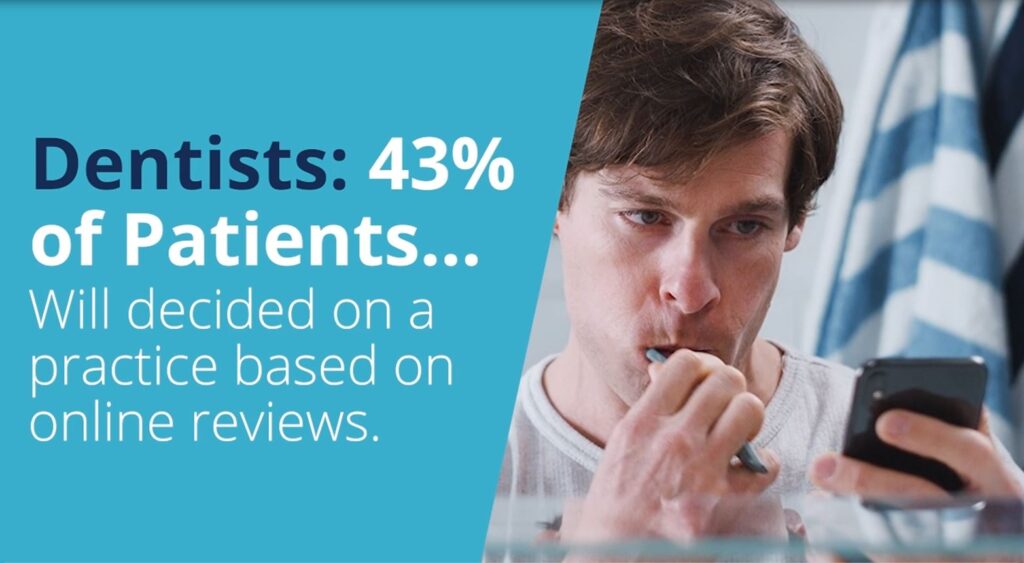How do your patients find you? Patients place a high value on others’ experiences, and the quality of your practice’s reputation directly impacts your success. Eighty-seven percent of searchers trust online reviews when looking for a dental practice. And with the dramatic increase of local search and online reviews, there’s no shortage of testimonials for them to access.
Before you start wondering whether or not your patients are looking for you online, we’ll save you the time—they are! Finding a new healthcare provider is never easy. The obvious solution is searching online, and research supports this. Seventy-seven percent of Americans use search engines to find healthcare providers. About 43% will make their final decision solely based on testimonials found on the internet.
So patients are looking for you online, but they’re looking at a lot more than your website. They’re reading your dental practice reviews on your Google My Business page, WebMD and more. When they do, what do they learn about your practice?
Internet testimonials are scary, because they are entirely out of your control. Sure, providing a five-star experience when they visit your practice significantly reduces the chances of a bad review. But despite your best efforts, not every patient will be fair.
Fortunately, there are actions you can take to harness this digital marketing tool. (Yes, online reviews are marketing tools!) Here’s how to use reviews to build up rather than tear down your dental practice.
Why should dental practices care about online reviews?
Your patients care, so you need to care, too. Studies show half of consumers don’t consider using a business with less than four stars in a five-star rating system. If you have 3.9 stars and a competing practice has 4.3, you’re likely in trouble. And patients do believe reviews. Four out of five people value testimonials they read on the internet just as much as referrals from people they know.
Potential patients are clearly using online reviews to determine what practices they’ll patronize and which ones they’ll avoid. But there’s another reason you should care about online reviews: search engine optimization (SEO).
You’re probably familiar with SEO in terms of your website and social media. But online reviews can impact your SEO too. Review aggregator sites like Google My Business, Yelp and WebMD have a high domain authority. That means search engines trust their opinion of you when calculating your rankings. When these sites backlink to your site, you get an SEO boost.
The more reviews your business has on review sites, the more backlinks your website has. Some SEO professionals actually believe backlinks are the most critical ranking factor. So the more backlinks you have, the more significant a boost to your SEO and page rank.
Many SEO industry leaders believe your star-rating also impacts page rank. The more stars you have, the higher you’ll appear in Google search results. About 28% of people choose the first search result on Google, while 75% never venture past the first page of results. Page rank matters. SEO matters. Reviews matter.
Should your dental practice ask for reviews?
Even though asking for reviews might feel a bit desperate, it isn’t. Asking your patients to review your practice is essential to achieving the best testimonials and highest rank possible. And believe it or not, people are usually happy to help! Nearly 70% of consumers say they’d write a review if asked by a business to do so.
Many practices request patients submit reviews in follow-up emails, paperwork or statements given after an appointment. Others encourage review writing with signs on their front doors or prompts on their business cards. Some even offer a $5 Starbucks gift card or other small gift to incentivize patients to follow through. For dental offices, the most popular and worthwhile places to ask for reviews are Google and WebMD.
Collecting as many high-quality, helpful reviews should be your goal. But you can’t just get a few good reviews and then stop. Using reviews as a digital marketing strategy is an ongoing process. About 86% of consumers only read reviews written within the last three months. And 73% only pay attention to those added in the previous 30 days. Asking patients to write reviews not only increases your SEO and (hopefully) your star ranking, but also helps keep the content fresh.
There isn’t a wrong way to respectfully solicit dental practice reviews. The biggest mistake is not asking at all.
Should your dental practice respond to negative reviews?
Negative dental practice reviews are challenging. Confrontation is never pleasant, but the conventional wisdom is to respond in a strategic, thoughtful way. (Note: Only respond to those who are upset about customer service, never to comments criticizing medical care.) When you do comment back, acknowledge any wrongdoing on the part of your practice and have empathy. Suggest a solution and follow through if the patient agrees.
When someone takes the time to write a review, they generally want to hear back from the business. And they expect a prompt response. About half of reviewers want a response within two days of posting.
What about positive comments?
If a patient posts their good experience or a compliment, get back to them quickly with a thank you. Acknowledge the comment online, but also make a note in their patient record. Thank the patient in person, and take that opportunity to ask for a referral.
For better or worse, online dental practice reviews are here to stay. Patients place a high value on what other people think about your dental practice, as they should. So turn this digital marketing phenomenon into a tool you can benefit from by encouraging the conversation and thoughtfully engaging when necessary.
Need help with online reviews? Dreamscape Marketing is a full-service marketing agency well-versed in the transformative power of online reviews. Call us today at 888.307.7304 to talk about how we can help your practice.







